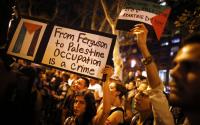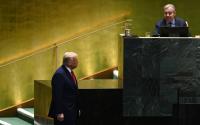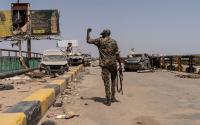10 November 2003The Independent
Osama Bin Laden has an awful lot of friends in Saudi Arabia. In the mosques, among the disenchanted youth, among the security forces, even and this is what the West declines to discuss within the royal family. Saudi ambassadors routinely dismiss these facts as "unfounded" but Saturday's devastating attack in the capital, Riyadh, is part of a growing insurrection against Bin Laden's enemies in the House of Saud.
Whether or not the bombers were members of the Saudi security forces they were certainly wearing Saudi military uniforms the Riyadh government's own version of the "war on terror" is now provoking bombings, gun battles and killings almost every day in the kingdom. The dead were all apparently Muslims, most of them expatriate workers.
The enemies of the House of Saud want tomake the kingdom ungovernable just as America's enemies in Iraq want to make US occupation ineffective. Iraqis are still the principal victims of the bombings in Baghdad, just as the Saudis were the principal victims on Saturday night.
After years of procrastination, the Saudi authorities are passing on some of their intelligence to the United States. For once, the latest warning from Washington that al-Qa'ida's next attack was moving from the "theoretical" to the "operational" stage was spot on the mark. But the Saudi royal family provided plenty of reasons during the Anglo-American invasion of Iraq this year for their Arab enemies to attack them. For although they publicly maintained that the US would not use Saudi military facilities during the war, they quietly allowed the Americans to direct 2,700 air sorties a day from the huge Prince Sultan air base. Far more damagingly, they even gave secret permission for 200 US combat aircraft at the base to fly 700 combat missions over Iraq daily.
The Jordanians suspect the bombing of their embassy in Baghdad this summer was retaliation for a secret military operation in which 26 US F/A-18 fighter bombers flew missions from a Jordanian air base to bomb Iraqi air force facilities.
So, Crown Prince Abdullah, in effect the ruler of Saudi Arabia, must be feeling some frightening winds blowing across the Saudi desert this winter. For by a weird coincidence, Bin Laden's principal aim to destroy the royal family is shared by the American right wing. When Laurent Murawiec, a friend of the then US defence policy board chairman Richard Perle, gave his odd but damning assessment of Saudi Arabia as an enemy of the United States and the "Kernel of Evil" he might have been a spokesman for Bin Laden.
Mr Murawiec, who works with the Rand corporation and who has been an executive editor of Executive Intelligence Revue owned by Lyndon La Rouche Jr, convicted felon presented a slide show to the Pentagon last year with titles that included "taking 'Saudi' out of Arabia". He claimed that Saudis were seen by other Arabs as "lazy, overbearing, dishonest, corrupt" and that they are "active at every level of the terror chain", from financier to foot soldier.
There persists in Washington the suspicion that the Saudi royal family is still trying to compromise with the religious hierarchy and with its al-Qa'ida enemies. The Pentagon and the CIA, for example, remain angry that Saudi clerics allegedly named on one of Bin Laden's videotapes as supporting the 11 September attacks are still preaching freely in Saudi Arabia. Bin Laden's messages are still laced with venom for the House of Saud. Indeed, his original and still most important aim is to do what Laurent Murawiec demanded: to take the "Saudi" out of Arabia.
Now it looks as if his erstwhile protectors have abandoned him when his side of the royal family are in far greater peril. Could this be true? Could the Americans sit back and watch al-Qa'ida take over the nation's oil wells? There are those in the House of Saud who take a particularly fearful view of American policy. In the past, they say, the Americans could sit in Saudi Arabia and seize the Iraqi oilfields whenever they chose to cross the border. Now they are in Iraq, they can in the event of a revolution just drive in the other direction and seize the oilfields in northern Saudi Arabia, leaving Riyadh and other cities to whichever Arabian ruler takes control.






